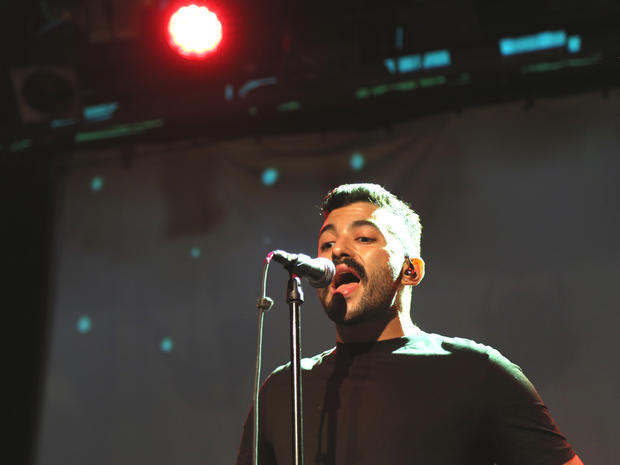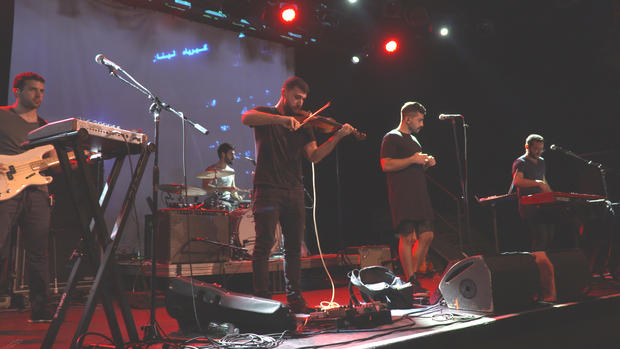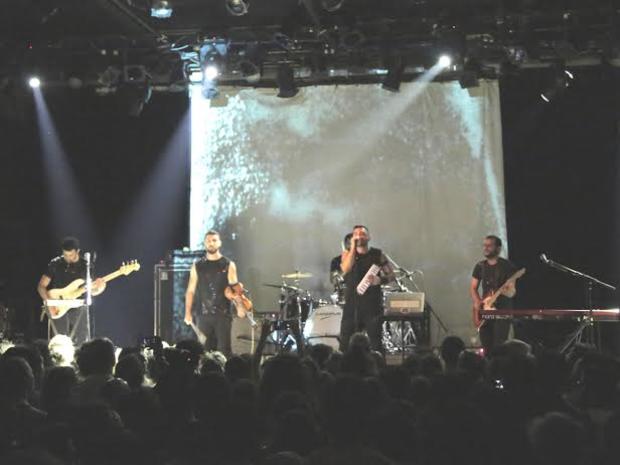Hamed Sinno: Gay, Arab musician tackles inequality, marginalization and Orlando shooting
NEW YORK - It's mid-afternoon at the Music Hall of Williamsburg in Brooklyn. Hamed Sinno is running through a final sound check. His eyes closed, he sings a capella, filling the room with his rich voice and dynamic vibrato, displaying a clear sense of confidence he didn't always have.
"When I was growing up in Beirut there really was no mention of homosexuality in a way that made it okay for me. And I struggled for a really, really long time with that and just you know trying to accept myself and not thinking that I essentially deserve to be thrown off a building," said Sinno.
The 28-year-old is Lebanese-American, born into a Muslim family and openly gay.
He has been in the public eye for several years as the lead singer for the indie-pop/rock band Mashrou' Leila, which means "overnight project."The band was formed in 2008 and consists of four other members, all from Lebanon: violinist Haig Papazian, drummer Carl Gerges, bassist Ibrahim Badr and Firas Abou Fakher, who plays keyboard and guitar.
CBS News spoke with Sinno about two weeks before the attack on a gay nightclub in Orlando that left 49 people dead and dozens more wounded. He addressed the tragedy in a show in Washington D.C the next night.
"There are a bunch of us who are queer who feel assaulted by that attack who can't mourn because we're also from Muslim families and we exist ... this is what it looks like to be called both a terrorist and a faggot."
Mashrou' Leila is known for championing LGBTQ rights and tackling the topics of Lebanese politics, religion, gender equality and sexual freedom through their songs. For musicians coming out of the Arab world, they're navigating largely uncharted waters.
"I think to some extent, queer critique of a lot of things does sort of open the floor for the possibility of completely renegotiating society as we know it," said Sinno. "I also just essentially come from a part of the world where advances when it comes to gender equality and queer liberationalism and trans[gender] equality - a lot of the stuff hasn't really been addressed [in] the way it should have been addressed at this point."
Sinno writes the music, which is all in Arabic. The band avoids sticking to a particular genre and includes pop, rock, Arab folk, and classical influences.
"There is this one track on the last album called "Tayf" (ghost) and it's about this gay club in Beirut that got shut down by the municipality. I sort of just really like the writing on it," said Sinno.
The band is currently wrapping their second U.S. tour, but they're primarily based in Lebanon. They have also toured in Europe and across the Middle East.
In April, Mashrou' Leila had problems in Jordan after they say the Ministry of Tourism banned them from playing their scheduled performance at a Roman amphitheater in Amman.
Mashrou' Leila said the official explanation they received was that their performance would have been at odds with the "'authenticity" of the site.
"We also have been unofficially informed that we will never be allowed to play again anywhere in Jordan due to our political and religious beliefs and endorsement of gender equality and sexual freedom," the band said in a statement.
They say that ban was eventually lifted, but their struggles are ongoing. Sinno and the band has received death threats from people in the Middle East. Sinno said that the threats mostly consist of Twitter trolling, but what scares him most is when when people start threatening their audience.
Sinno believes a lot of the Middle Eastern LGBTQ struggle is rooted in the representation of queerness in the Middle East that ends up being "offensive and hurtful."
"It just furthers the isolation, and the lack of conversation and the lack of equality. I think when you are young, that can be a really frightening thing to sort of operate within a sort of cultural framework that keeps telling you you are inferior, that keeps telling you you are something to be laughed at," said Sinno.
In the U.S., Sinno feels another kind of struggle.
"Honestly, I get kind of scared walking down the street because I am very visibly Arab. It's not like one of those things where I pass as being anything else, I just look straight-up Arab. And I feel like the amount of aggression directed at the Arab community and the Muslim community at this point is much more frightening actually than the kind of aggression that is addressed towards the LGBT community in Lebanon," said Sinno.
He wants to be clear that one struggle isn't less significant than the other, but the fear for him personally is far greater as an Arab in the U.S.
But that clearly hasn't stopped him from coming back.
During their Brooklyn concert, Mashrou' Leila feeds off of their audience's enthusiasm, the crowd sustaining a wall of noise throughout the performance. The band is wearing black sequined shirts and Sinno shines as he sways to the beat.
It is clear to see the love that Sinno and his band members have for what they do.
"I get messages from queer people in the Middle East telling me that the band makes them feel better about it [being LGBTQ], makes them feel like they could get empowered, that they could or can come out if they want to. And that feels incredible for me because I needed that when I was growing up and I just couldn't find it in Arabic," said Sinno.



